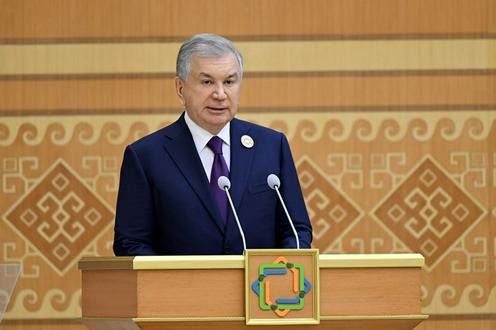Uzbekistan’s President Shavkat Mirziyoyev has proposed the establishment of a UN-backed Fund for Promoting the Logistics Integration of Landlocked Countries. The need for investment in transport infrastructure in Central Asia is estimated at $40 billion annually, according to the president’s press service.
Speaking at the Third United Nations Conference on Landlocked Developing Countries, held in the national tourist zone of Avaza in Turkmenbashy, Turkmenistan, Mirziyoyev unveiled a series of additional initiatives aimed at addressing shared challenges and problems.
He emphasized the urgent need for coordinated efforts to develop international transport corridors and infrastructure. In particular, the president pointed to the importance of accelerating construction of the Uzbekistan–Afghanistan–Pakistan railway and linking it with the ongoing China–Kyrgyzstan–Uzbekistan rail project. According to Mirziyoyev, this would help create a new trade and economic space and a more resilient transport network in the region.
He also called for unlocking the full potential of the Middle Corridor, including through coordinated transit policies, standardized regulations, and optimized container shipping tariffs.
In addition, the Uzbek president proposed the drafting of a Global Transit Guarantee Agreement for landlocked countries under UN auspices. This document, he argued, would ensure fair access to ports and communication channels, reduce transport risks, and help mitigate global logistics inequalities.
Mirziyoyev further initiated the creation of a Global Vulnerability Index for landlocked countries. The index would help identify transit constraints, inform the expansion of international financial and technical programs, and enable more effective resource distribution based on real conditions.
He also highlighted the importance of establishing an Innovation Hub for Agricultural Development in Uzbekistan, which would promote adaptive technologies, water-saving innovations, and food security.
Uzbekistan, Mirziyoyev said, is ready to take part in the work of an international think tank dedicated to landlocked countries.
According to the World Bank, high transport costs result in up to 2 percent GDP losses annually for Central Asian states. Logistics expenses can amount to as much as 60 percent of total goods value—several times higher than the global average. Shared challenges include high tariffs, limited capacity along transport corridors, and dependency on the customs and transit policies of neighboring states.
Solving these issues, Mirziyoyev said, will require collaborative projects and joint initiatives.
“Access to global markets must be equal for everyone. This is not only an economic necessity—it is above all a fundamental condition for sustainable development, trust, and cooperation in international relations,” the president stated.
The Third United Nations Conference on Landlocked Developing Countries was held in Avaza, Turkmenistan. The event was chaired by Turkmenistan’s President Serdar Berdymukhamedov and attended by UN Secretary-General António Guterres, as well as the leaders of Kazakhstan (Kassym-Jomart Tokayev), Tajikistan (Emomali Rahmon), Uzbekistan (Shavkat Mirziyoyev), and a number of other heads of state and government, along with representatives of international and regional organizations.
The Avaza Political Declaration was adopted at the close of the conference.










